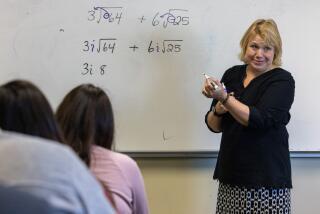Words of Wisdom on How to Get the Most Out of College
- Share via
A university president, a symphony conductor, an Internet mogul, a Cabinet member and a student were asked to answer this question: What are the two most important courses for college students to take? Here are their responses.
Patrick Swygert, president, Howard University:
Regardless of what discipline you might pursue, you need as an undergraduate a course in logic.
The second would be any foreign-language course. It gives you, like logic, a kind of discipline. You think in another dimension in another language. Hopefully, through the language, you will be introduced to a different culture, issues and ideas.
I was very fortunate at Howard as an undergraduate student. I studied German. German was really alien to my experience, coming from South Philadelphia, but it introduced a host of ideas and notions beyond simply the language itself--philosophers and thinkers and music.
Donna E. Shalala, secretary, U.S. Department of Health and Human Services:
I would recommend that today’s student take introduction to computer science and a literature course on William Shakespeare.
We all know computer technology is necessary for any future career, but how can we face our future without also learning about the human spirit? Through the written word, Shakespeare teaches us about the power of the heart and soul, about the depths and heights of the human spirit. A worthwhile education should nurture both the analytical and creative elements of our minds.
Steve Case, chief executive, America Online:
I think a broad-based liberal arts education provides important grounding, especially since we are entering a phase of unusual change as we kick off what likely will become known as the Internet century.
A shift to a more connected society will have profound impacts on business, education and government as new perspectives are brought to bear. So having a broad understanding of the past and on the future will be more important than ever--and that’s what a liberal arts education can help provide.
Leonard Slatkin, music director, National Symphony Orchestra:
1. An introductory philosophy course. It gives a global perspective on how the ideas of the world have come to be shaped.
2. Some sort of introduction to the history of music (assuming that there has not been proper teaching of this in the student’s earlier academic life). This is a subject that it is never too late to learn.
3. I would urge every student to take a language. As we grow and travel, our awareness of the world is heightened by interaction with people of other countries. There is no better way to get to know these people than by a basic ability to communicate in their language.
Ben Trachtenberg, junior, Yale University:
Everyone should take a course on classical thought --be it philosophy, literature, politics or history--because it’s too easy to view modern journals as the entirety of collected wisdom on a subject, which they are not. Much of what current thinkers advocate has been said before, and often with more grace and clarity.
The need for a good American history course comes from Americans’ woeful ignorance of our common heritage. Once you become an American, you become heir to Jefferson, Madison, Jay and all the other great people we owe so much to. Students who don’t know about Salem--or even McCarthy--won’t see a demagogue for what he is as quickly as they should.
If education is to mean something beyond job training, perhaps even the creation of good citizens, it must be grounded in some sense of a shared experience. Without that, it’s hard to imagine Americans sharing a vision for the future.
More to Read
The biggest entertainment stories
Get our big stories about Hollywood, film, television, music, arts, culture and more right in your inbox as soon as they publish.
You may occasionally receive promotional content from the Los Angeles Times.










